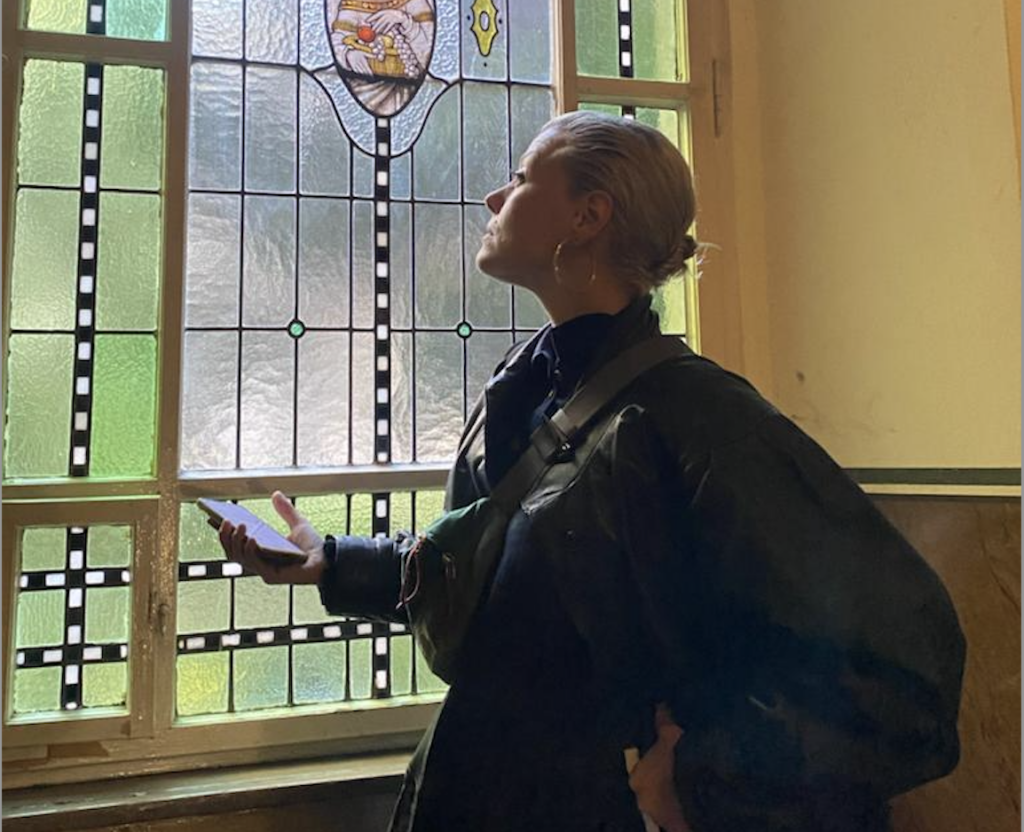
L. Zylberberg, is an artist who has been based in Berlin for the past 14 years. Moving to the German capital after completing a Bachelor of Fine Art in Melbourne and Amsterdam, she focused on visual art creating incredibly detailed and textured images and playful installations that served as a natural precursor to the electronic music she makes today. Her latest release, her her, is out via Präsens Editionen (also available on tape at Sameheads in Berlin).
In the summer, you released your debut album called her her. It is a lush amalgam of sounds, organic and playful. What does her her mean to you? What themes, ideas and feelings did you translate into it?
Her her was made as a kind of soundtrack to a journey I wanted us to go on. I was walking around a lot and it’s fairly obvious but I was noticing how sounds can be transitional. Like taking a train or having a conversation. You have moved through to a different space or to a different understanding where you and your space are transformed. This was my starting point.
What does the title “her her” denote? (thoughts of femininity automatically come to mind, but these might just be superficial preconceptions).
“Her her” is an open play on words – it sounds like a laugh. A chuckle, maybe sarcastic, maybe cartoonish. Maybe there is something funny about the feminine or their words. About ownership or about the third person. Maybe it’s singling them out or picking them to be on your team. Maybe the punchline of a joke or an intimate acknowledgement. Her her her her her her..
Can you talk about your music-making process? How do you create your sounds? For instance, on track “theresno”, there is an excerpt of a conversation and field recordings, etc.
Sometimes I hear the music in my head and then I fuck it up trying to replicate it or it just becomes something else that sucks or even sometimes doesn’t suck. Other times I just let a long and indirect process happen. There is a lot of conceptualising, a lot of distraction and a lot of epiphanies. Also wrong way/dead ends. In short: I don’t really know! I keep trying.
In her her I made many field recordings and as I was creating I was enjoying wandering around with my ears open. I was thinking about the concept of transporting spaces. I really like the idea that we can overlap multiple places at the same time. I wondered: where are we, when we are experiencing ‘there’ here?
Prior to delving into the world of sound, you were active in visual art and installations. How did this practice differ from your sonic one, and do you still work in the visual art field?
I think music is very visual and visual art can be melodic/rhythmic. What I mean to say is that it feels just as natural or as weird or hard or wonderful as anything else to reach for a keyboard or a pencil. The difference that I’m stuck on is that we can listen to music everywhere including at a gallery and see the work with our eyes closed.
You have been living in Berlin for more than 14 years, and are associated with the eclectic music venue and initiative Sameheads, where you also run your own night called Twista. Can you talk about the event, and this particular scene you are part of in Berlin? (which could be an antithesis to the oh-so-serious Berghain style techno scene that many associate with Berlin).
14 years! I guess I’m still in love (with myself in Berlin).
Twista is a fun party that aims at inviting more challenging or interesting performers that do not necessarily fit so seamlessly into the hedonistic party environment of a nightclub. We have had some pretty incredible artists playing in that little smokey basement (recently also including fellow shapey Pö!). Good times.
To be honest I’m not a big club person. I grew up in the 90’s in the suburbs of Melbourne, Australia sneaking out of home to go to illegal warehouse raves in the outer suburbs. The institutionalised mega-clubs are not something I relate to all that deeply.. Or is everything institutional and commercial?!
Ah the scene! It’s where I believe people are willing to hold up in the fringes even if it hurts them a bit, because the fringes are important.
What are your plans for this year?
I’ve been studying Audio Engineering which I will complete by September this year. So I’m really looking forward to working more on my new live set and finishing some new music as well as prancing around and maybe some day drinking.
Check out more of L. Zylberberg’s music here.
Interview Lucia Udvardyova